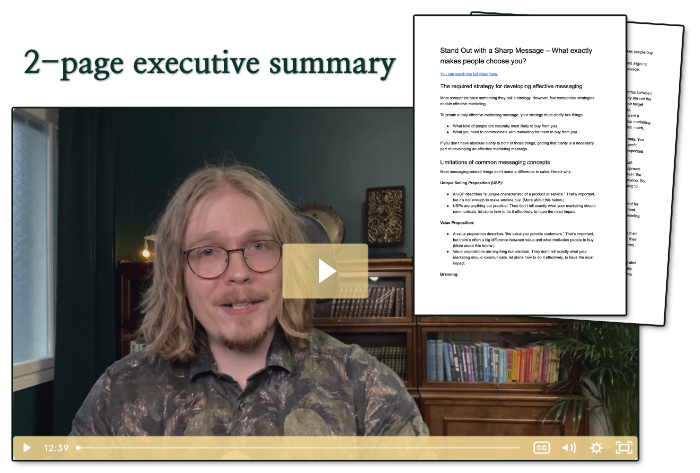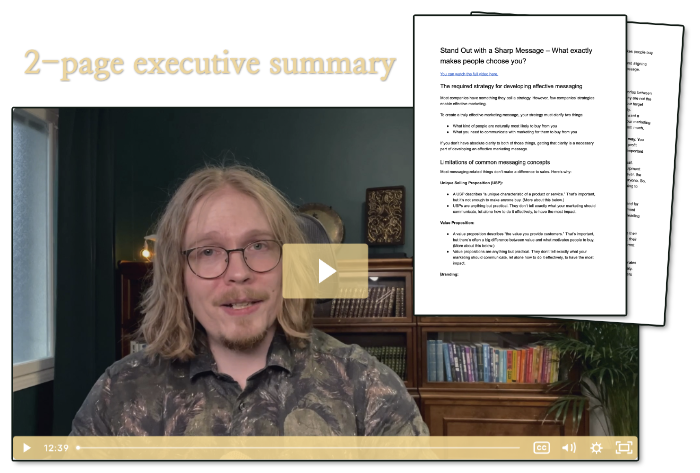In the realm of leadership and marketing, opinions often reign supreme. Having strong opinions you defend fiercely is seen as a sign of great leadership and a requirement for effective decision making.
However, opinions are not the best basis for decisions. On the contrary, opinions naturally hinder progress, adaptability, and critical thinking.
The alternative is “conditional decisions.” They encourage improvement and open dialogue. They are easier to implement. And they lead to faster, more consistent progress in the long-term.
The problem with opinion-based decision making
An opinion-based decision boils down to, “We’ll do A, because I think it’s best.”
The problem isn’t that your opinion would necessarily have anything wrong with it. However, unless you spell out exactly how you formed the opinion, there’s a good chance some personal bias or flawed assumptions affected it.
Even more importantly, what happens when something changes? Will you automatically reconsider your decisions? Most people don’t.
Also, few humans enjoy admitting they were wrong. Organizations have died because leaders refused to see that their opinions led the company in the wrong direction. Even if you’ve meditated your ego to oblivion, not everyone else in your company is as eager to find out they were wrong.
What are “conditional decisions?”
Conditional decisions are in the form, “We know X, Y, and Z. Based on that, we assume A, B, and C. Because of that, the best course of action seems to be Q.” If X, Y, or Z changes, the assumptions will naturally change. If A, B, or C assumption is proven wrong, the decision gets naturally reevaluated, too.
How most people reach a decision is that they first form an opinion and then start to justify it and find evidence to support it. That leads to their opinion having an outsized impact on their decision.
Making conditional decisions directs you (and everyone else) to change their perspective. Rather than forming an opinion, which they will then try to justify, you have to explain your thinking as you reach a conclusion.
For example, some time ago I reviewed a client’s marketing campaign plan. They were going to invest a lot of time and money into building it, so although they’re a marketing company, they wanted another set of eyes on it.
The only major issue I highlighted was the overall complexity of the campaign. However, I didn’t just say, “I think a simpler campaign will work better.” I explained it something like this:
“We’ve seen in your (and other similar companies’) previous campaigns that what drives the most sales are X and Y. Because of that, I think we should make sure X and Y have the best chance to perform well. In the plan, you have elements A, B, and C, which all seem like they could individually improve sales. However, they take a lot of attention away from X and Y. Given that A clearly supports X and Y, I’d keep that in. But I’d remove B or C, if not both, to ensure X and Y will work.”
There was obviously a lot more we considered, but I hope you see the point. (In case you’re curious, they didn’t take my advice for that campaign because the final decision maker liked their original plan. They even told me that they were more interested in the much smaller optimizations I could suggest for them. However, the campaign results were among the worst they had seen in years. Their next campaign was much more in line with my suggestions and performed far better than their average.)
Make it a habit
You will always have opinions. However, you can make developing conditional decisions into a habit.
For example, when I help marketing leaders, I rarely tell my opinion on something directly. Rather, I first explain what I think are the most impactful variables. I then explain how I interpret them and what I base those interpretations on. And only then I suggest what it all means.
It takes more time. Rather than 2-3 seconds it takes to blurt out an opinion, it might take 2-3 minutes for me to explain how I reach the conclusion. And often people challenge something I say during those 2-3 minutes, which can lead to a whole new conversation.
That’s precisely the point; when the reasoning behind a decision is out in the open, it’s easy to evaluate it.
For example, a B-to-B client was recently starting regular email marketing. The big question was, “What should the emails be like for them to generate sales?”
In their case, I had an assumption that they could use a certain kind of case study based format, which I’ve seen work great in many similar cases.
However, I didn’t just say that. I went over what I see as the most impactful things about email marketing for a company like theirs (and why I think they are so impactful). As I explained my idea, I could make the reasoning clear.
They liked the idea, but they were worried about certain aspects of implementation. So, we went over ways they can make it easier to create the types of emails I had suggested.
After about 15 minutes of discussion, we reached a decision. You could say that’s a long time. But in those 15 minutes, we made a plan of how to execute the idea and even discussed how they can manage the most likely challenges. If we hadn’t considered what might go wrong and how to deal with that, our decision would’ve potentially led to issues with no viable solutions.
In many companies, the same decision would take a series of meetings. All together, those meetings would certainly take far longer than 15 minutes. Yet, the decision would still boil down to, “Mr. Boss likes this option.”
Leaders aren’t meant to have opinions
Contrary to popular belief, as a leader, your function is not to have opinions. Your function is to make decisions. You don’t need opinions for that.
Even more clearly, you and your team shouldn’t defend poor decisions. Yet, that’s what making decisions based on opinions easily leads to.
Maybe the captain should sink with the ship if it’s their own bad decisions that got them there. But if the captain gets (and accepts) the right help in making those decisions, the ship wouldn’t be on the rocks in the first place.
The more impactful your decisions are, the more harm even a small mistake makes. You could spend a decade meditating in a cave to quiet your ego. Or you could use conditional decision making to make it easier for you (and your team) to recognize issues and change course quickly without anyone feeling sidelined, attacked, or hurt.


